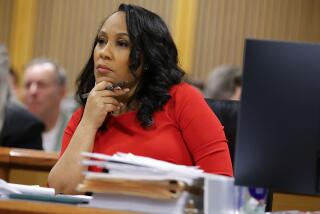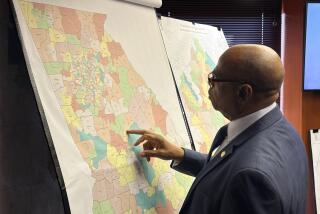Obama court nominee faces tough questions from Senate Democrats
President Obama’s controversial pick for a federal judgeship in Georgia told senators that votes he cast as a state legislator would not be “indicative” of how he would decide cases, as he sought to win over Democrats skeptical of his record on civil rights, abortion and other politically sensitive issues.
Michael Boggs, nominated to serve on a district court in Georgia as part of a compromise with the state’s two Republican senators, explained that as a state representative he wrestled with whether to vote his conscience or reflect the will of his conservative district. In response to tough questioning from the panel’s Democratic majority, he explained, and in some cases apologized for, votes that liberal and civil rights groups say ought to disqualify him.
The former two-term state legislator, now a Georgia appeals court judge, said he regretted his vote on an amendment that required doctors to disclose the number of abortions they performed. The measure was “ill-conceived” and represented a “public safety risk,” he said.
He left his position on same-sex marriage unclear, saying his previous opposition “may or may not have changed.”
And he described as “agonizing” the decision of whether to reinstate a version of the state flag that included the Confederate stars and bars.
“On that issue particularly, the overwhelming majority of constituents in my one county that I represented ... desired that Georgians be permitted an opportunity to vote on whether Georgia changed the flag,” he said. “That’s why I cast the vote the way I did.”
Democrats who hold the key to Boggs’ fate sounded skeptical of his answers. Sen. Al Franken (D-Minn.) grilled him over what he saw as inconsistencies between his statements before the committee and what he had said publicly after one of the flag votes.
Sen. Dianne Feinstein (D-Calif.), the panel’s second-most-senior member, noted that answers Boggs had given on questions regarding abortion sounded similar to ones offered by previous conservative nominees for the Supreme Court. Women’s groups are rallying against Boggs because he sponsored legislation that would have required parents to attend their teenagers’ abortions and supported legislation to define children as “both born and unborn.”
“So I have to make a judgment whether you mean what you say,” she said. “For my vote I have to have certainty. And I don’t know quite how to get it in view of this record.”
“He clearly regrets a lot of what he did as a state legislator,” said Sen. Richard Blumenthal (D-Conn.), who chaired Tuesday’s hearing. “He’s disavowed a lot of what he said. I have to assess the sincerity and significance of today’s hearing and also review some more records.”
Boggs was one of a slate of picks for the federal bench in Georgia offered by the president after negotiations with Republican Sens. Saxby Chambliss and Johnny Isakson.
By virtue of what’s called the “blue slip” procedure, senators have the ability to block consideration of judicial nominees from their states. Senate Judiciary Committee Chairman Patrick J. Leahy (D-Vt.) has been pressured to forgo the senatorial courtesy since it has held up judicial nominees even after Democrats changed Senate rules to eliminate filibusters against potential judges.
After Tuesday’s hearing, senators are expected to send written questions to Boggs on a range of issues before the Judiciary Committee votes on his nomination. Because the panel’s eight Republican members are expected to support him, he would need votes from two of the 10 Democrats on the panel to advance his nomination to the full Senate.
But even if he gains endorsement of the committee, Senate Majority Leader Harry Reid (D-Nev.) on Tuesday would not commit to holding a confirmation vote. Reid pointedly declined to say he would support Boggs after endorsing a different nominee who has drawn some liberal opposition, David Barron.
“We’ll see,” Reid told reporters when asked whether he would schedule a vote on Boggs.
The White House defended Obama’s choice, saying the president believed Boggs was “qualified and ought to be confirmed.” Officials pointed to how Boggs had decided cases as an appellate judge.
White House spokesman Jay Carney also noted that the compromise reached with Georgia’s senators would pave the way for five women, including two African American women, to be confirmed to the federal bench.
“Our choice is clear -- do we work with Republican senators to find a compromise, or should we leave the seats vacant?” Carney told reporters.
More to Read
Sign up for Essential California
The most important California stories and recommendations in your inbox every morning.
You may occasionally receive promotional content from the Los Angeles Times.











